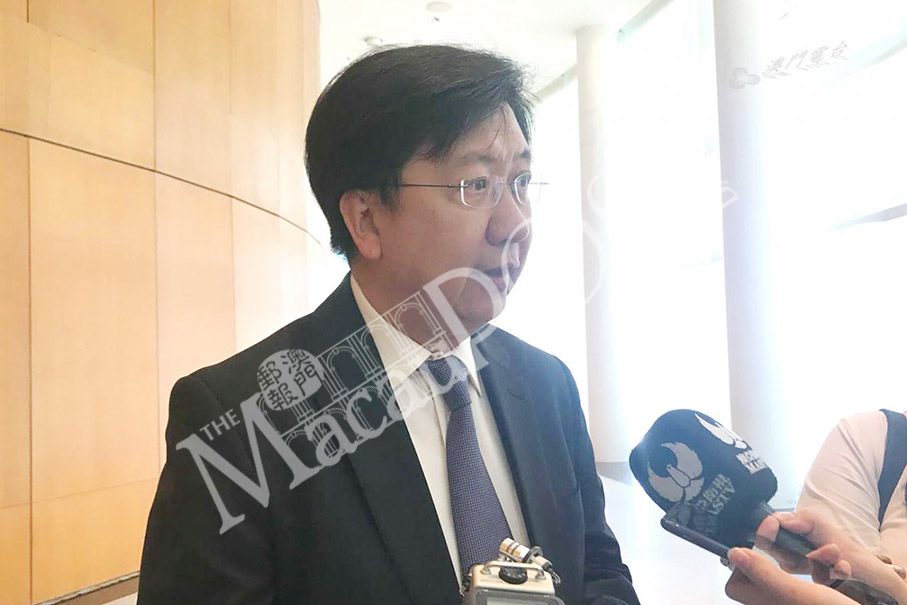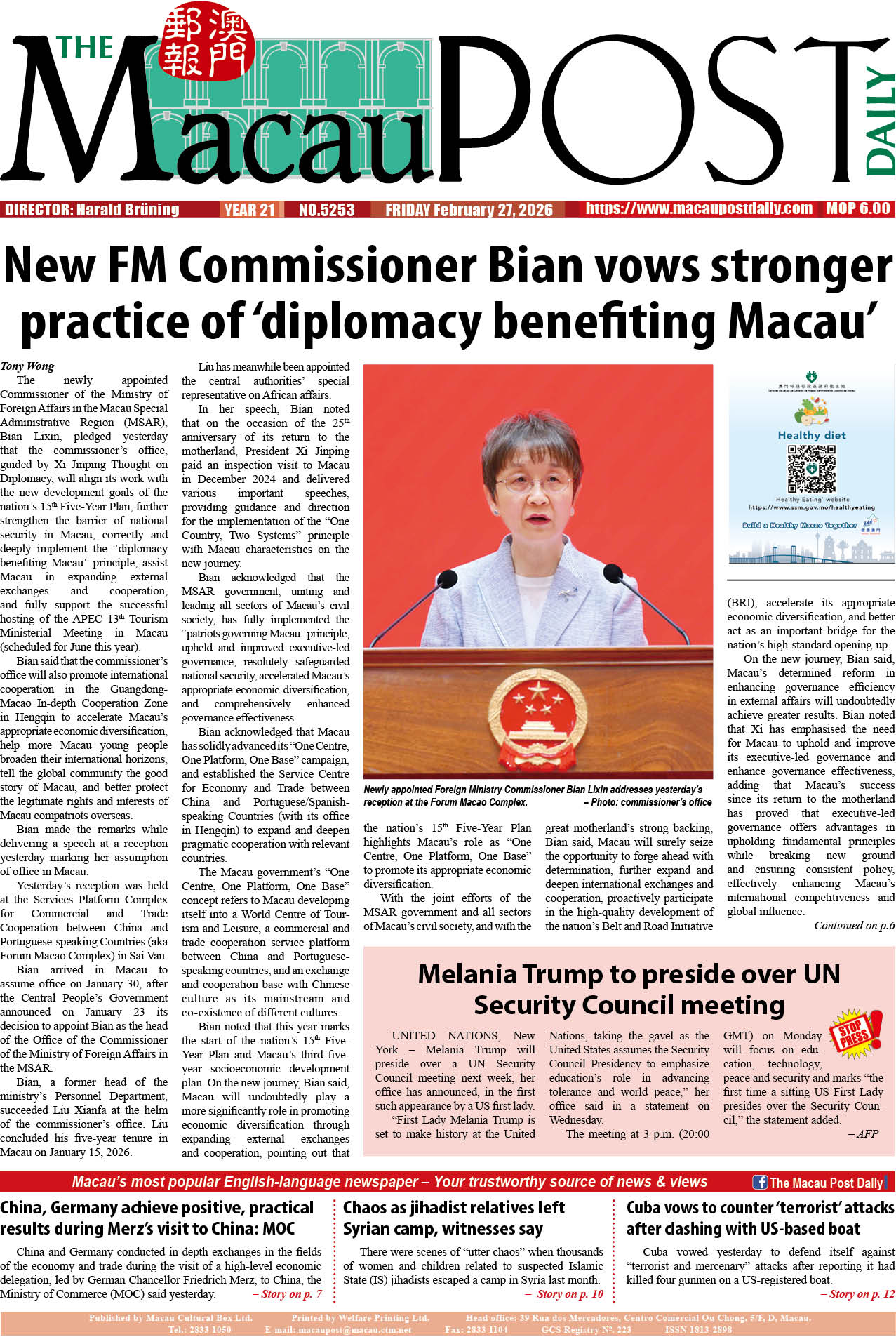Addressing yesterday’s press conference about Macau’s novel coronavirus situation, Tai Wa Hou, a clinical director of the public Conde de São Januário Hospital Centre, announced that from 9 a.m. today the Macau Health Code system will add a new function allowing those with a fever to book a free nucleic acid test (NAT).
According to Tai, the measure aims to strengthen the Health Bureau’s (SSM) COVID-19 screening of those with a fever in response to the ongoing COVID-19 spread in the mainland.
Tai pointed out that the negative results of the free COVID-19 tests cannot be used for crossing the Macau-mainland border – i.e. the results will not be displayed on their Macau Health Code, as the free tests merely aim to screen residents for COVID-19. Those who need to travel between Macau and the mainland have to book a nucleic acid test on the government’s appointment system for members of the general public – for which they have to pay a testing fee of 80 patacas each time, Tai noted.
In addition, Tai also urged residents to suspend unnecessary travel to all regions in the mainland other than Guangdong province due to the ongoing novel coronavirus transmissions in the mainland.
During yesterday’s press conference, Tai noted that COVID-19 has recently been spreading in the mainland quickly, adding that the ongoing COVID-19 wave in the mainland has also been caused by transmissions of the Delta variant, which was first “imported” into Nanjing before spreading to different regions across the mainland.
Tai reaffirmed that the Delta variant – the mutant strain that was first detected in India – has a high viral load and fast transmission speed, apart from the fact that it normally takes a longer time for the nucleic acid test (NAT) results of those who have been infected with the Delta variant to become negative – compared to the original novel coronavirus.
Tai also noted that many tourist attractions in the mainland are normally crowded now due to the ongoing summer holiday period. In addition, the ongoing COVID-19 epidemic in the mainland originated from Nanjing Lukou International Airport, which is used by a large number of travellers, because of which, Tai said, the novel coronavirus has been spreading to various provinces and cities in the mainland. The Health Bureau believes that COVID-19 will continue to spread to more regions in the mainland in the near future, Tai said.
Consequently, Tai said, the Health Bureau is urging residents to suspend unnecessary travel to all provinces, autonomous regions and municipalities other than Guangdong. Tai also said that if residents really have the need to travel to the mainland, they should carefully check whether their destination is affected by COVID-19 before starting their journey. Residents “must” suspend travelling to areas affected by COVID-19, Tai said.
In addition to again urging residents to be inoculated against COVID-19 as soon as possible, Tai also reminded senior citizens and those with chronic diseases who have not been fully vaccinated against COVID-19 to avoid leaving Macau.
Tai announced that in response to the latest COVID-19 developments in the mainland, the Health Bureau has rolled out a new measure with the aim of strengthening its COVID-19 screening of those with a fever. From 9 a.m. today, Tai said, the Macau Health Code will add a new option linking to the government’s appointment system for free nucleic acid tests, with the aim of making it more convenient for those with a fever, as well as those with a yellow Macau Health Code, to book a free COVID-19 test. According to Tai, the free nucleic acid tests are available at the Taipa Ferry Terminal testing station, the Macau Forum testing station, and the NAT station in the public Conde de São Januário Hospital Centre.
Low vaccination rate among seniors
Meanwhile, Tai also underlined the “smooth” operation of the government’s new measure – which started yesterday – allowing all those aged 60 or over to get their walk-in COVID-19 vaccinations at all inoculation facilities in the city. Tai mentioned the example of 21 senior citizens who received their COVID-19 jabs at the Areia Preta Health Centre yesterday without making an appointment during the first two hours of the centre’s opening, with the oldest one among them being aged 80.
As of 4 p.m. yesterday, 516,374 doses of COVID-19 vaccine had been administered to 286,954 people in Macau, comprising 55,772 who had received their first jab and 231,182 who had received their second jab.
Macau’s COVID-19 vaccination rate stood at 42 percent as of 4 p.m. yesterday – i.e. over 40 percent of the population has received at least one jab.
A total of 15 adverse events were reported in the past 24 hours (until 4 p.m. yesterday). The total number of adverse events since the start of the vaccination drive stood at 2,186, or 0.42 percent of the total number of jabs, including seven serious cases.
However, Tai underlined the low COVID-19 vaccination rate among senior citizens in Macau so far: 21 percent among those aged between 60 and 69, 10 percent among those aged from 70 to 79, and two percent among those aged 80 or over. Tai said that Macau’s COVID-19 vaccination rate among senior citizens is far lower than those aged between 20 and 59.
Two types of COVID-19 vaccines are currently available in Macau, China’s Sinopharm inactivated vaccine and Germany’s BioNTech mRNA vaccine. Around 85 percent of vaccinees in Macau have chosen Sinopharm jabs since the launch of the vaccination programme in February, while the remainder have opted for BioNTech shots.
Among senior citizens, according to Tai, around 75 percent of vaccinees have chosen Sinopharm jabs while the remainder have received BioNTech shots.
“The vaccination rate among senior citizens is not ideal,” Tai said.
3,000 to 4,000 doses per day
Meanwhile, Tai also said that 3,000 to 4,000 COVID-19 jabs have been administered per day in recent days, adding that the Health Bureau has not seen a significant increase in the number of residents getting their jabs because of the ongoing COVID-19 epidemic in the mainland. “Residents appear not to feel an urgency to get COVID-19 jabs this time, unlike last time when Guangzhou was hit by COVID-19 transmissions,” Tai said.
The Health Bureau said last month that Guangzhou’s local COVID-19 epidemic, which started in May and ended in late June, had resulted in a large increase in the number of people in Macau getting their jabs.
Tai again urged residents to be inoculated against COVID-19 as the Health Bureau cannot rule out the possibility that the novel coronavirus has spread to Macau from the mainland.
Rule out pecuniary vaccination measures
Tai also said that for the time being the Macau government will not consider rolling out pecuniary measures to boost COVID-19 vaccinations. Tai said that the government will continue to adhere to its three major measures to increase the city’s vaccination rate, namely 1) strengthening its COVID-19 vaccine information campaign, 2) making it more convenient for residents to get their jabs, and 3) launching free-of-charge vaccinations – which cover local residents, non-resident workers and non-local students enrolled in Macau.
Low inoculation rate among civil servants
Meanwhile, Tai also revealed that the COVID-19 vaccination rate among civil servants stands at around 42 percent, about the same as members of the general public. Tai underlined that civil servants, like medical workers, have the responsibility and duty to be inoculated against COVID-19. In addition to getting their COVID-19 jabs, civil servants should also assist the government in its vaccination campaigns by urging others to be inoculated against COVID-19, Tai said, adding that “the vaccination rate among civil servants is not ideal”.
The Macau Post Daily asked whether the Macau government would consider requiring civil servants who have not been inoculated against COVID-19 to undergo COVID-19 tests regularly for which they would have to pay, similar to a measure recently announced by the Hong Kong government for its civil servants. In reply, Tai noted that civil servants in Macau working on the frontline, such as public sector medical workers, customs officers and immigration officers who have not had their COVID-19 jabs are required to undergo a free COVID-19 test every two weeks.
Tai underlined that the Macau government will stick to its existing policy to boost COVID-19 vaccinations among civil servants primarily through awareness campaigns. Tai said that the government could not “punish” public servants choosing not to be inoculated against COVID-19 by requiring them to be tested for COVID-19 regularly.
Tai Wa Hou, one of the three clinical directors of the public Conde de São Januário Hospital Centre, addresses yesterday’s press conference about the city’s novel coronavirus (COVID-19) situation. Photo: Tony Wong







